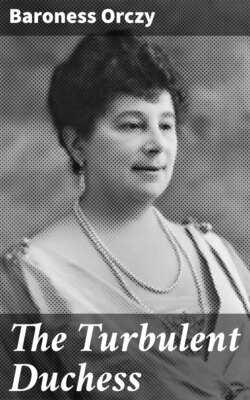Читать книгу The Turbulent Duchess - Baroness Orczy - Страница 6
На сайте Литреса книга снята с продажи.
Chapter II Cinderella
ОглавлениеTable of Contents
Caroline Ferdinande sat at her piano and sang:
Il était une fois une petite Cendrillon
Toute digne de pitié!
And she sang to the end of its fourteen verses that doleful song which relates all the human miseries which a legendary little Cinderella was made very unjustly to endure.
She was now nearly seventeen and it became more and more manifest every day that she was not wanted, and that she would remain to the end of her days on the matrimonial shelf. Her education had been shamefully mismanaged: she was wilful, ambitious and was for ever chafing against her fate, which she believed could never be anything but dreary and inglorious. What prospects had she of being anything else but an old maid, at best the Mother Superior of an impoverished convent? She had no money, no estates, no influence. King Ferdinand, her grandfather, had sold or bartered every bit of land he could lay his hands on; the name which he had transmitted to his family was a byword in Europe, despised, derided and now even execrated. Oh, she, Caroline Ferdinande, Princess of Naples, was indeed a poor little Cinderella worthy only of pity! She was extremely sorry for herself: nothing consoled her, neither music nor painting, nor the orange groves which she loved. Hector de Lucchesi-Palli tried to comfort her whenever she gave him the chance, but these chances came at very rare intervals now, and the conviction of her dreary future became stronger and more insistent in her girlish mind.
Hector did his best to amuse her by provoking fights often with young men much older than himself and he brought as much zest into these fights as if his life depended on victory. An English sailor taught him boxing; and he threw himself with ardour into training for the noble art. As soon as he felt that he was fairly proficient in it, he arranged bouts with some of the young officers on board the English men-of-war that were at anchor in the Bay of Naples. At first, Caroline Ferdinande was interested; she even screamed and clapped her hands at tense moments during the fight, as she had done in the past. But the novelty soon wore off. She was a doleful little Cinderella whom nobody wanted.
“I can’t even marry Hector,” she said to herself: “they wouldn’t let me.”
“They” being her grandparents. Her mother was dead, her father had married again, a Spanish princess, who presented him with a new family, a round dozen of them in the end. Caroline Ferdinande disliked her stepmother intensely, and she simply wouldn’t look at her baby stepbrothers and sisters as these were presented to her in rotation when they made their appearance into the world. Her pride, her wilfulness and decidedly sharp temper cut her off from companionship with children of her own age. Nor did she court that companionship. She felt that she was unloved and unwanted and was too proud to bestow affection where none was asked for.
For Hector de Lucchesi-Palli alone she harboured a kind of cool friendship, not unmixed with gentle contempt because of what she put down as meekness of spirit. He alone put up with all her tantrums, and though his own temper could be sharp enough on occasions, he never lost it even when she was most provoking. But what was the good of letting oneself care about him in any way but comradeship. “They” would never allow her to marry him, even if his father and elder brother happened to die and he came into the fine old title of Duke della Grazzia. Nor did he ever make love to her. She didn’t think that he really cared for her in that way. So when she sang, “II était une fois une petite Cendrillon ...” and Hector stood behind her and tried to say something pleasant and comforting, she just swung round on the piano stool and slapped his face—not hard enough to hurt him, but just to show him that she was not taken in by his sentimental talk.
“And,” she went on tartly, “I don’t know why you waste your time listening to my bad singing when Donna Anna has a voice like a nightingale and will sing to you most melodiously and entirely out of tune.”
Donna Anna was the only child of the Marquis di Mauro-Ganari, the richest nobleman in Sicily, and it was common talk in Palermo that she was in love with the young Count de Lucchesi-Palli, and that both families would look with favour on an alliance between them.
Wasn’t it enough to provoke a saint—and Caroline Ferdinande was no saint—to see the meek way in which Hector made no reply to her taunt and did not even take the trouble to declare that her singing was in every way superior to Donna Anna’s birdlike strains? Donna Anna was one of those women whom Caroline Ferdinande disliked even more than she did her own family; not because she sang out of tune, but because she put on such superior airs, the airs of a rich young girl, round whom the masculine flower of Sicilian aristocracy gathered, as flies do around a honey-pot. When she was present at any ball or Court function, no other girl had a chance of filling her dance programme until Donna Anna’s was full, and all the attentions that Princess Caroline herself got from those young jackanapes were those which she commanded by virtue of her royal rank.
The only satisfaction that Caroline Ferdinande got out of Donna Anna’s presence at such functions was that even the beautiful heiress of the Mauro-Ganari millions was obliged to kiss her hand.
